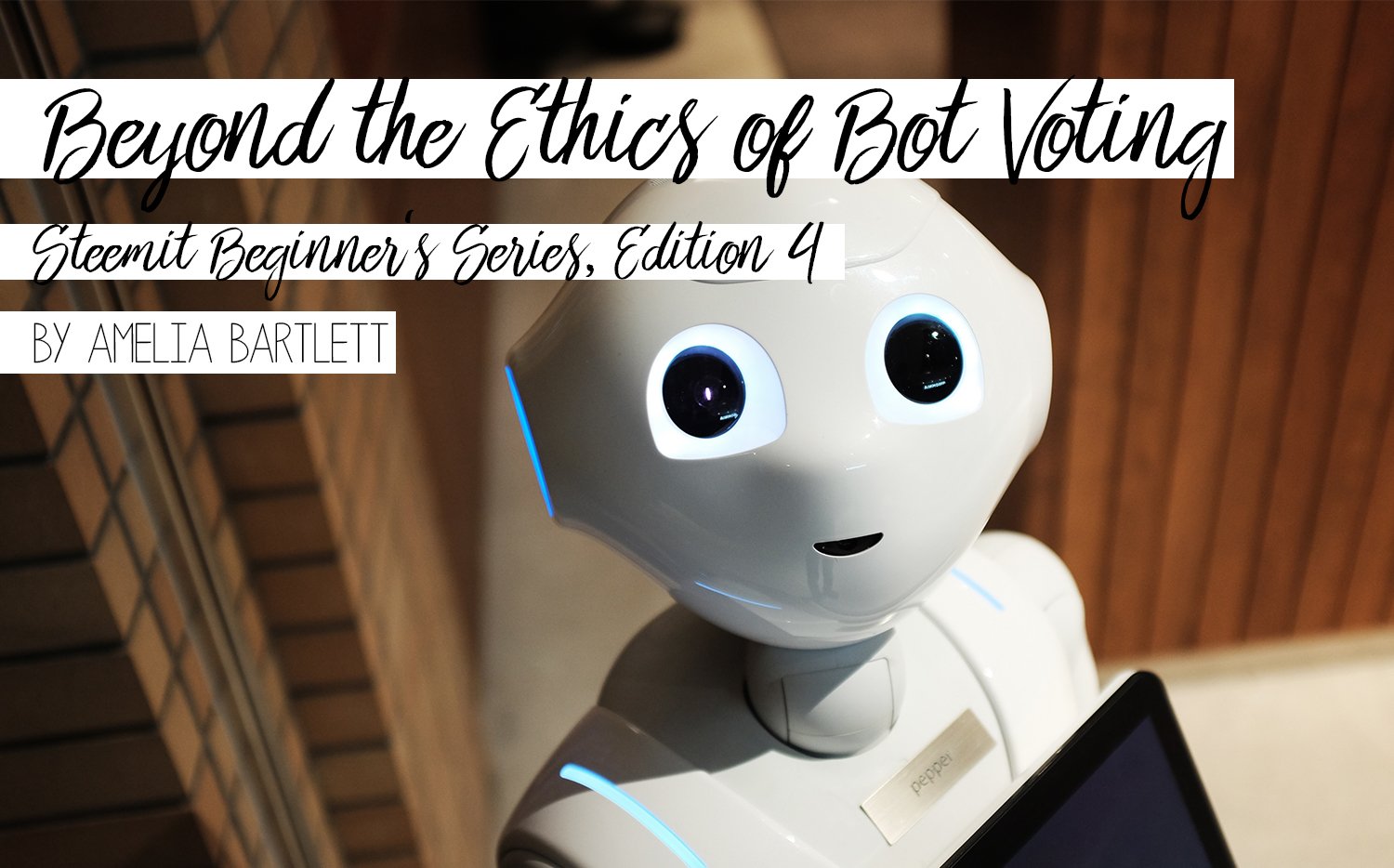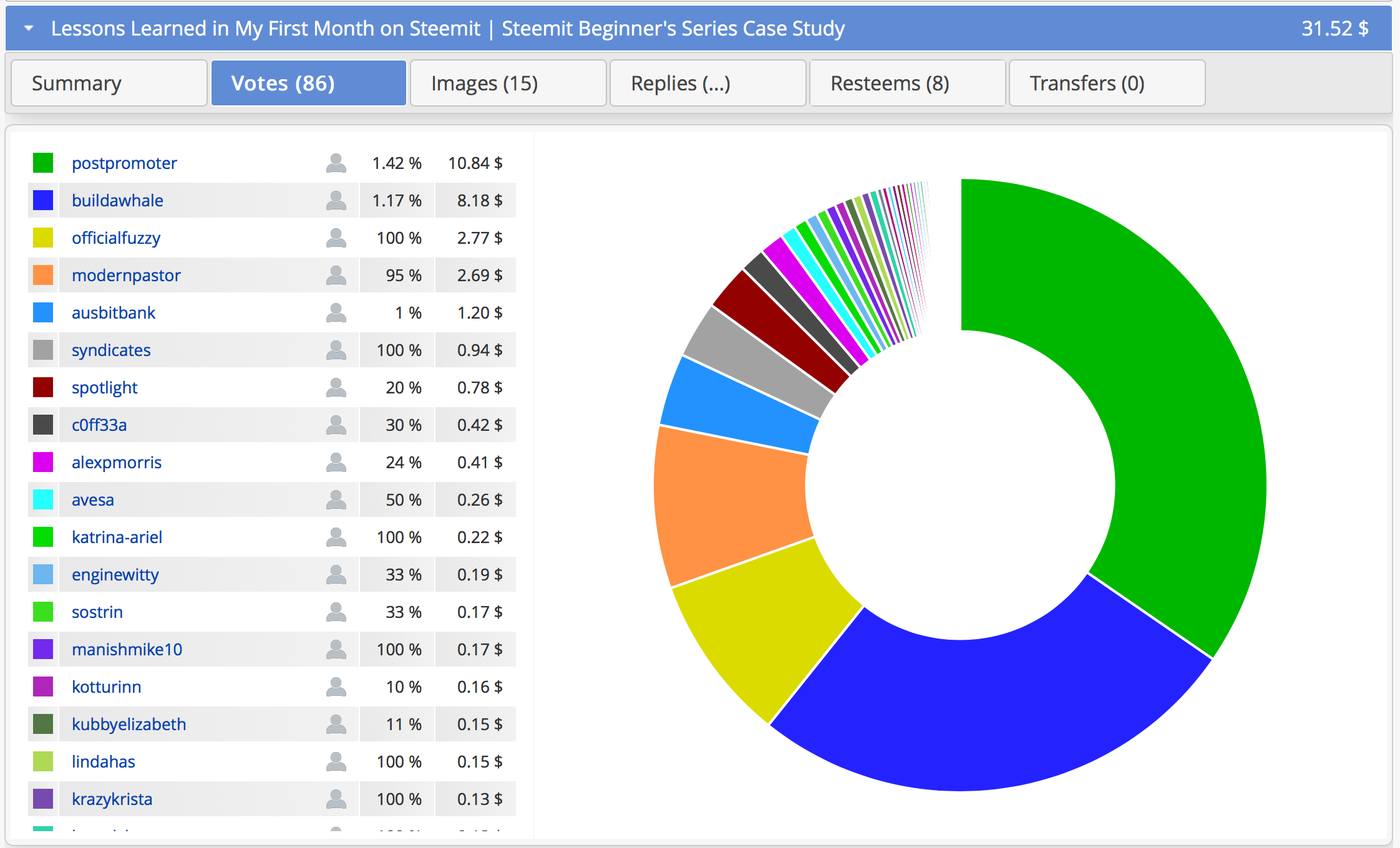
Photo from Unsplash
Last week, I ventured into the treacherous waters of Bot Voting. Even bringing the topic up in various Discord chats made for uncomfortable, and sometimes heated, debate. This Steemit beginner's post serves to educate on my personal experience, and the advice I received from others.
Multiple justifications for using bot voting and for fighting against it came to my attention:
You can earn a fairly decent return (which I did experience) and can be beneficial for writers without much-expected payout.
The appearance of a post with higher payout values has two disparate effects: Some are drawn in and assume the post is better for its higher earnings and Some are repelled by the higher earnings because they don't see a potentially valuable curation return possible.
Curie* and other curation services do not curate posts with bot-votes, which strips away your potential of > $50 upvotes and reposts by respected communities.
*Correction: Curie WILL still curate even after a bot vote so long as the post has not exceeded $10 payout estimate. - verified by @carlgnash
There is a literal vote/flag war going on that I will briefly mention but otherwise stay 100% out of the way of that path of destruction.
Self-promotion through bot voting is akin to marketing your business (if Steemit authorship is your 'business') and marketing is generally ethical.
Voting bots have a trail which you may experience benefit from, and there's a small chance this may earn you a couple followers who review their votes.
Bots create an unfair distribution of the reward pool based on wealth and influence, not out quality.
I implore you to take this post with a grain of salt, to do further research, and to determine your perspective of bot-voting and paid voting strategies.
This is an important issue circulating throughout the Steemit platform and its ethical implications extend beyond us, into the blockchain. Bots are a source of centralization, and being a decentralized platform puts this concept in direct competition with what we're building.
Having tested the view from both sides of the fence - with and without bot voting - I have come to a few conclusions. These perspectives are my own and are not an advisement for how you should think or act.
My results with bot voting:
- I first engaged @bumper with a 0.5 SBD amount and saw 0 return. I'm not even sure a vote took place. Chalk up a loss.
Recieved a tip from a friend to track bots at SteemVoter and felt confident trying again.
- Sent 3 SBD to @buildawhale for my previous Steemit Beginner's Series and saw a fairly decent return, so two days later, I experimented further by sending 5 SBD to @postpromoter and also saw a decent return:

Screenshot pulled from my own data on Steem World
I saw a 273% return on @buildawhale and 217% return on @postpromoter. And, more than 50% the comments on this article came from individuals within my network.
Worth noting, Curie does not curate articles about Steemit, so even though I negated my ability to be curated by them using a bot vote, it was a moot point.
- Over the course of the week, I sent a combined total of 49.5 SBD to various bots for these posts: Steemit Beginner's Series, Kalanchoe (photography), Women Taking Leaps, Exploring KMA, Slow Rolling Home, and my actual profit was:
15.85 SBD
Personally, it was exciting seeing higher post values. It was exciting to see posts that normally earned 2 SBD or less earning upwards of 20 SBD. But somehow, it didn't amount to more than 32% on my investment.
Around the time I was slowing down both voting, I was asking fellow Steemians in my main communities: @thealliance, @steemsugars, @promo-mentors, @teamgirlpowa, and through @shadowspub's community Steemit Ramble, about their opinions and experience with bots. Discussions were instantly heated and opinionated.
Then, in a Curie Q&A with curator @carlgnash, the strong concern for reward pool fairness and the earnings structure on Steemit came up.
When I approached Carl today for a quote on this topic, he was quick to clarify with me that this was not a rewards pool issue first and foremost, in his opinion. I proceeded to grill him (politely) about the non-ethical argument against using voting bots. His primary concern: Wealth concentration as a result of delegation to voting bots for profit.
How familiar are you with vote selling?
You may have seen generous dolphins and whales delegating SP to causes, communities, and individuals they believe can further their positive impact. I've personally seen initiatives like @overkillcoin's Dolphin For a Week impact small communities and I've personally benefited from the @adoptaminnow program when @saffisara, who "adopted me" delegated me a small amount of SP to keep me from bandwidth failure.
These delegations are happening largely because the individual holding large quantities of SP may not be able to maximize their power-impact.
Delegating empowers those with less power but dedication to upvoting quality content with additional 'influence.' In this type of delegation, the delegator is forgoing the maximum curation rewards potential for their SP value and those curation rewards go to the delegatee (who is doing the curation).

Photo from Unsplash
Yet, not all users with large amounts of Steem Power delegate for free. Many sell their delegations to voting services for a steady profit.
This profit is just business as it covers the cost of lost curation rewards and acts as an interest or 'rent' payment from the delegatees now benefiting from increased curation earnings and overall influence.
I have been unable to source or calculate an example percentage return on rental SP delegations, though I have collected raw data for any math-minds in the audience:
Example account: @freedom
Delegation to: @postpromoter, a bot I have used more than once
Delegation amount: 1,859,759.522 SP (3,800 M Vests)
Example weekly return (in SBD): $14,663.442 [last seven days]
Current exchange SBD to STEEM (2/26/18 at 3:20pm): $1.076 STEEM / 1 SBD
Weekly example return in STEEM with the potential to power-up: $15,777.8636 STEEM
I sourced all of this data from Steem Bot Tracker: Delegation, Steem Reports, Freedom's wallet, and the internal Steem market.
What does this data mean to you? I'd love to hear your opinion in the comments.
Investigating this data through transparent tools is made possible by the decentralized nature of the blockchain. I implore all new Steemians to learn about the services available to make your Steemit experience a more informed and educational journey.
Ethical concerns are a personal matter, and understanding the climate surrounding voting bots is important before you take your stance.
As a still-new Steemian creating this Beginner's Series, my intent is to help you learn from what I've tried, where I've stumbled, and how others have helped me. As tempting as it may be to get involved with the morally driven flag battles, whale wars, and the debate of wealth distribution on the platform, I can only advise that you understand what Steemit is to you and to go your own way.
Do you have questions about voting bots, vote selling, renting Steem delegation, and the reward pool?
Ask them in the comments below and I will do my best to answer or do the research required to find the answer for you!

Hi, I'm Amelia! It's nice to meet you.
I'm a writer, minimalist, tiny home dweller, and maker living in East Tennessee, USA. My blog has lived at www.amelia-bartlett.com until I discovered Steemit, where I now post most of my work. To learn more about me, check out my introduction post, get up-to-date on my school bus tiny house conversion, and follow me for articles on slow living, sustainable fashion, self-expression, and quality curated resteems!
Proud member of

banner by @bearone





